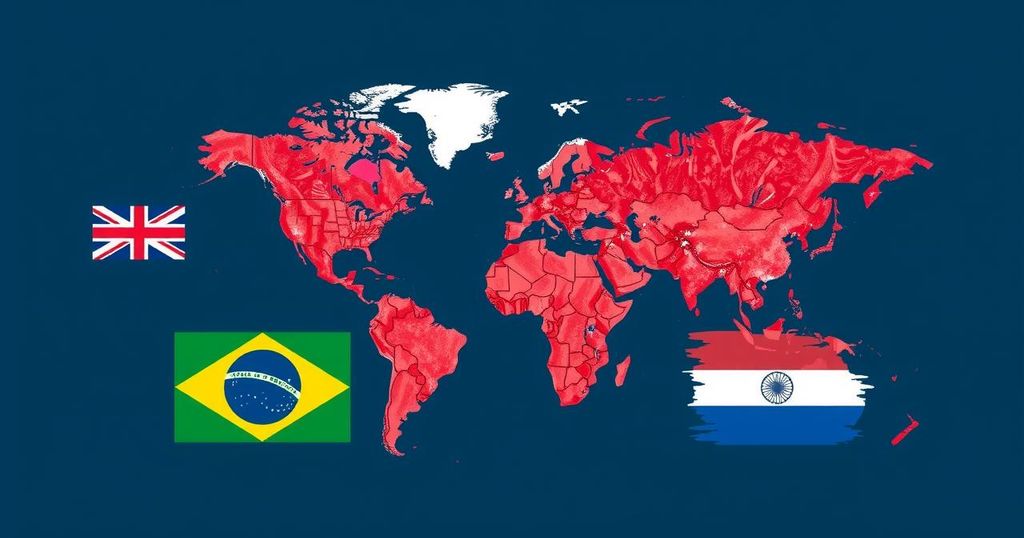Rising Beef Imports: Implications for the U.S. Cattle Industry
The United States is set to increase beef imports from Australia, Brazil, and Uruguay by at least 50 percent in 2024 compared to 2023. Increased demand for “grinding beef” and contrasting cattle cycles in exporting countries are significant contributors to this trend. While imports help stabilize prices for consumers, they pose risks to domestic cattle producers, raising concerns about the long-term effects on the American cattle industry.
The United States is poised to significantly increase its beef imports from Australia, Brazil, and Uruguay in 2024, with estimates ranging from a 50 to 64 percent rise compared to 2023 figures. According to data from the U.S. Department of Agriculture (USDA), Australia is expected to export 64 percent more beef, Brazil 50 percent more, and Uruguayan beef shipments are anticipated to grow by 57 percent. These imports primarily consist of “lean grind” or “grinding beef,” which is distributed in frozen form. Eric Nelson, a cattle feeder in Iowa and director at R-CALF USA, noted that such increases could negatively affect domestic cattle prices, particularly for cull cows, which depend on the value of imported grinding beef. Analyst Altin Kalo of the Chicago Mercantile Exchange highlights various factors driving this surge in beef imports, including a high demand for beef with additional fat content. The current trends mirror those from 2015 when beef imports spiked. An ongoing cattle cycle in the U.S. contrasts with Australia, where herd numbers have peaked, facilitating greater exports to the U.S., which is experiencing a shortage of lean beef due to a reduced cowherd. Significantly, imports from Australia remain tariff-free due to a Free Trade Agreement between the two nations, allowing American consumers to benefit from lower beef prices as the USDA forecasts a peak in import levels not seen in a decade. While the demand from China remains stable, allowing supply shifts from Australia to the U.S., Brazilian beef has also entered the American market after years of restrictions, albeit still subject to higher tariffs. Additionally, the influx of Mexican feeder cattle has increased, with recent USDA forecasts predicting a notable rise in imports. Concerns persist over American agriculture’s reliance on foreign beef imports, potentially jeopardizing domestic cattle prices and the stability of the local cattle industry. There is a consensus among stakeholders that unless strategies are implemented to protect local farmers, the long-term implications could negatively impact the American food supply chain.
The increase in beef imports into the United States is largely influenced by market demands and cattle cycles in exporting countries, particularly Australia and Brazil. Australian cattle herds are at their peak, allowing for increased exports while the U.S. faces a decline in its cattle population, leading to higher domestic beef prices. The Free Trade Agreement between the U.S. and Australia plays a critical role by eliminating tariffs, encouraging the import of beef to meet consumer demand. Conversely, Brazil’s entry into the U.S. market marks a shift after years of prohibition, although imports are constrained by tariffs. The trends in cattle imports are reflective of broader economic factors, shaping beef pricing and availability.
In conclusion, the U.S. is expected to see a substantial rise in beef imports from Australia, Brazil, and Uruguay in 2024. This increase is anticipated to impact domestic cattle prices negatively, particularly for cull cows, as imports are driven by various market dynamics, including consumer demand and agricultural cycles in exporting countries. While the reduction of tariffs on Australian beef presents benefits for American consumers, concerns about the implications for the domestic cattle industry remain paramount, highlighting the need for a balanced approach to trade and agricultural policy moving forward.
Original Source: www.tsln.com




Post Comment